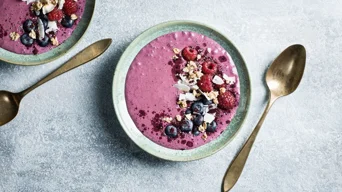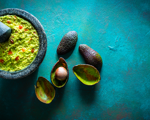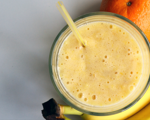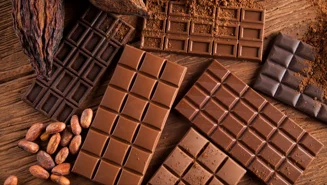
Skyr is an Icelandic-style dairy product that has gained global popularity for its distinct taste. In general, protein contributes to maintaining muscle mass and normal bones, and it is often divided into two main categories: animal-based protein and plant-based protein. As skyr is a dairy product, it belongs in the first category.
Many believe that skyr is a good source of protein, so in this article, we dig into the popular dairy product that many eat for breakfast, use in smoothies, as a dipping, and much more.
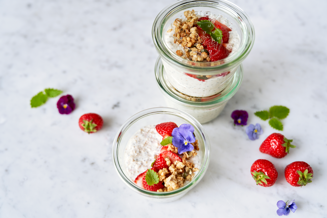
The exact amount varies depending on the specific product, but skyr generally contains about 11 grams of protein per 100 grams, and protein delivers about 63 % of the total energy value.
An added benefit is its flexibility in the kitchen. It is typically available in various flavours like vanilla, strawberry, pear, and blueberry, to name just a few. Each of these flavours offers an exciting twist to the plain natural skyr, making it a treat to your taste buds. While the flavoured versions may have slightly different nutritional profiles due to the added fruits or flavourings, the level of protein in skyr generally remains high.
Whether you are looking for a delicious breakfast option, a satisfying snack, or a sweet post- or pre-workout treat, skyr can be a great choice.
What type of protein is in skyr?
Casein is the predominant protein type in skyr. It is naturally present in milk and preserved in high concentrations during the skyr production process. Casein protein is a complete protein, and you can read more about it here.
Skyr vs Greek yoghurt
While skyr and Greek yoghurt may appear similar at first glance as they are both cultured dairy products, they have distinct differences in protein content, taste, and texture.
Skyr is traditionally made from skimmed milk, while Greek yoghurt and Greek-style yoghurt are often made with whole milk, though there are low-fat and fat-free versions available. The production, however, is quite similar in that it involves the addition of live active cultures, after which they are strained to remove the whey.
As for the protein content, you will typically find more protein in skyr than in Greek yoghurt, due to the specific fermentation process it undergoes. Depending on the specific type, Greek-style yoghurt usually contains about 9.2 grams of protein per 100 grams, and protein makes up about 52.3 % of the total energy value. Variants with a higher fat content usually contain about 5 grams of protein per 100 grams, equalling 17.5 % of the total energy value.
Both skyr and Greek-style yoghurt have a thick and creamy consistency, but skyr is often thicker and creamier with a mild and slightly sweet and tart taste, while Greek yoghurt is tangier. So, while they share many similarities, their distinct characteristics make them different from one another, offering a delightful variety.
Related Articles
Looking to learn about protein content in different foods? Explore our comprehensive guides:



